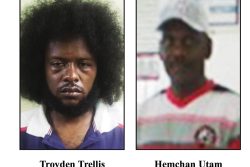By Horace (Raymond) Leonard Henriques
July 2, 1945 – June 5, 2023
Editor’s Note: This week we share a short story written by Guyanese Professor, Horace (Raymond) Henriques, who died on January 5th, 2023, after 7 years of enduring a rapid decline of Lewy Body dementia and Parkinsonian symptoms. He taught Sociology at the University of Toronto for over 20 years, and was an outstanding mentor to hundreds of students. Raymond was their non-judgmental mentor who they could trust and show their vulnerabilities. He gave students countless hours of deep academic coaching, listening and counseling. He also gave his students the most important ingredient for future success —- unconditional love and empathy. At the moving celebration of his life held in Toronto last July, Jessica Henriques, Raymond’s daughter, shared the story with the following introduction:
“One of my father’s written works, which remains left undone, was his novel Jacob’s House (the working title for some years). It was largely based on his own experiences. Even during the early stages of Lewy Bodies Dementia, he made attempts to outline, explore and rewrite chapters…[this story] is a chapter I believe he felt was fairly complete, and one that shares a personal memory that he carried with him all his life. It was often accompanied with feeling deep shame and guilt about a choice he made one day after school. In his later years, he was able to make peace and understand it with the help of his beloved sociological perspective and some therapy of course. Maya Angelou said, “There is no greater agony than bearing an untold story inside you.” I believe in many ways, writing this chapter was also a very healing process for him. May we all find inspiration to share our own stories and hold space for each other.”
Any number of things can stir memories of the past and disturb the sands of sadness that have been deposited in areas of one’s mind scarcely visited. For me, a visit to my grandmother’s grave was one of those things, her tomb unattended and green with a moss-like growth, very much like most of the resting and deserted areas in the village cemetery.
Looking around, I thought that when villagers are finding it difficult to survive, they barely would have time for the dead. I placed a white handkerchief on my grandmother’s grave, sat down, and cradled my aging and wizened face with hands asking for forgiveness. I whispered to Muma, my name for my grandmother, and told her about the day I hid from her as she stood beneath the tree in front of my city school. I told her that I had written a story about that day and that I was going to read it to her. In a quivering voice, I began to read:
I had lived with Muma from the age of two years when my mother died; we lived in a village on the East Coast of Demerara, Guyana. She owned a rum shop and a pawnbrokery, a deadly combination for the village men who were the customers. But it was also not an environment in which to raise a child, an atmosphere of cussing fighting, and angry wives collecting their stumbling husbands.
While the setting of the rum shop interfered with my proper upbringing, according to the maternal urban side of my family, I enjoyed living in the village and being close to my cousins. I enjoyed sitting on the back steps of Muma’s house with them, exchanging stories with my cousins about the village characters like Money Bags, one of the village money lenders. For years, we had thought that he suffered from an enormous bulge in the general vicinity of his crotch. On his death, the villagers discovered that he did not have a hernia, but was a large bag in which he stored his money; thus, the name Money Bags.
By the age of eight, I had become a handful for Muma and my father, who had suffered a nervous disorder after my mother’s death and was of little help to her. Well, that’s not quite correct; he was helpful to her by approaching my maternal aunt and asking her to take me in, which she did. And that was a turning point in my life.
The movement from the village to the capital city of Guyana, Georgetown, was the beginning of my makeover. If in the village, I could skip school and no one appeared to notice, in the city it looked as if I were under surveillance. So, the very first day of school in the city, I skipped and my aunt found out by noticing that I was sunburnt. And that was not all, for in the village all that I needed was a large enamel cup, plate and an all-purpose big spoon, which can be used for solid and liquid foods alike. In the city, on the other hand, eating was encumbered by an armoury of forks, knives, spoons, various sizes and shapes of plates, bowls, cups and glasses; and, accompanying them was a slate of rules for the proper use of them such as not scraping the plate, not allowing the spoon to touch your teeth, not draining your glass or licking your spoon and so on.
Indeed, the dining room was a place for the performance of what is proper when it came to eating. And in the process, I became increasingly ashamed of the village and my relatives there; it appeared that whatever we did there was not proper. Among other things, we spoke village English, which was described as “dirty” and not “clean” English, the one spoken with a BBC accent. For instances, on one occasion when I returned to spend some time with Muma, some of the rum shop customers wanted to hear me “talk like ah Georgetown boy.” In addition, I slowly became disgusted with the way my village relatives ate; the way they scraped their plates and rained their glasses. The village had become a place to which I no longer enjoyed going, but one that reminded me of my various inadequacies.
However, I did not give in to those feelings easily; I ran away from home to return to the village and to Muma, my second mother. I sensed that she knew how I felt and would come, every Friday, to visit me at the city school which I attended. She would take the train from the village to the city; take a bus which dropped her off in front of the school; and, wait for me beneath a tree. She would then stand there in her black dress, short enough to reveal her elephantiasis feet. Next to her, she placed a large bag and in it were my weekly gifts from the village bakers such as Chinese cake and pine-tarts. In addition, she would always give me a new white handkerchief in which was knotted a shilling; she would then, using a large safety pin, secure it in one of my trousers’ inside pockets, her was of saying that she loved me.
And then after living in the city with my BBC relatives, I finally became ashamed of her. I watched her standing beneath the tree, with the bag and her weekly gifts. As I looked at her, I wondered what my friends were saying about my Muma. I began to imagine they were laughing about how she was dressed how scary she looked in that black dress. And something happened, rather than running towards her as I did in the past I took a route that avoided her seeing me. Muma returned the next week and the week after, but I did the same thing; then she stopped coming. I had finally become a “Georgetown Boy.”










